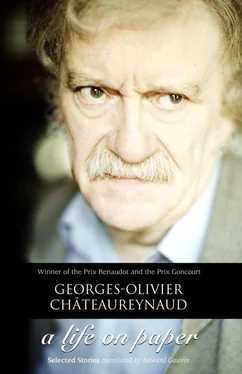Georges-Olivier Chateaureynaud - A Life on Paper - Stories
Здесь есть возможность читать онлайн «Georges-Olivier Chateaureynaud - A Life on Paper - Stories» весь текст электронной книги совершенно бесплатно (целиком полную версию без сокращений). В некоторых случаях можно слушать аудио, скачать через торрент в формате fb2 и присутствует краткое содержание. Год выпуска: 2010, Жанр: Современная проза, на английском языке. Описание произведения, (предисловие) а так же отзывы посетителей доступны на портале библиотеки ЛибКат.
- Название:A Life on Paper: Stories
- Автор:
- Жанр:
- Год:2010
- ISBN:нет данных
- Рейтинг книги:4 / 5. Голосов: 1
-
Избранное:Добавить в избранное
- Отзывы:
-
Ваша оценка:
- 80
- 1
- 2
- 3
- 4
- 5
A Life on Paper: Stories: краткое содержание, описание и аннотация
Предлагаем к чтению аннотацию, описание, краткое содержание или предисловие (зависит от того, что написал сам автор книги «A Life on Paper: Stories»). Если вы не нашли необходимую информацию о книге — напишите в комментариях, мы постараемся отыскать её.
A Life on Paper
A Life on Paper: Stories — читать онлайн бесплатно полную книгу (весь текст) целиком
Ниже представлен текст книги, разбитый по страницам. Система сохранения места последней прочитанной страницы, позволяет с удобством читать онлайн бесплатно книгу «A Life on Paper: Stories», без необходимости каждый раз заново искать на чём Вы остановились. Поставьте закладку, и сможете в любой момент перейти на страницу, на которой закончили чтение.
Интервал:
Закладка:
Maxence was drifting off, but the sight of the bottle restored his forces a bit, for he loved to drink, and the omelet they'd shared would have seemed more delicious with a pitcher of wine. The old man filled the goblets and set the flagon down in reach. The liquor was rough but did the job as well as any other. Maxence settled himself against the wall before picking up the trail of his thoughts once more. He was among men now, and knew what his hosts wanted to hear. He answered their desires, telling tales of Moorish serving girls and Italian bordellos, which he readily embellished with far-fetched or flattering episodes. Eyes wide, the forest-dwellers hung on his every word. They pressed on late into the night, he speaking, the others listening, and everyone drinking so much that the old man had long since fallen asleep on his bench when Maxence was at last done with his flowery fables.
"Well, my good men, that's how women are in those lands!"
Across from him, the son-in-law was nodding off, his nose sometimes dipping into his half-empty goblet. "What a life you've had! What women you've seen! We don't have any like that around here… Well, there is one, one beautiful woman in these parts, but she's…"
Maxence, who wanted only to crawl off to sleep, straightened in his drunken stupor and, as best he could, assumed the air of a great lover hearing tell of a legendary lonely lady. The man hesitated, as though fearing he'd said too much. Maxence pressed him. "Come now, a pretty damsel? You must tell me all about her!"
"A… damsel? Oh, I don't know… She is a beautiful woman, but…"
"But?"
"But… how should I put it? We think her a bit of a witch, milord, and she frightens us."
Maxence shrugged. "I've yet to meet a woman who frightens me! Come now, tell me everything! After all, you must, if she's a witch. Do you understand?"
The threat lurking behind his last words overcame the woodsman's scruples.
"Milord, she lives not far from us, on the island in the river. She lives alone. My father-in-law, who has indeed seen seventy winters, claims she's been there all his life. She was already living there, alone on the island, making charcoal, when he was a little bov:'
"What are you saying?"
"The truth, milord, as the old man has spoken it a hundred times."
"Then she must be a hundred if a day!"
"A hundred she may well be, but her hair is dark as the crow's wing, and the snow no whiter than her teeth or skin. Milord, it's girls of sixteen who seem crones beside her! I remember, for I saw her once, up close. My father-in-law had told me so much about her that I wanted to see her for myself, I went to the island. And suddenly there she was, standing before me, stepped out from behind a thicket."
"What did you do?"
"I gazed on her a long time. I was a young man, just married, my wife expecting our first child. And yet I swear to you, at her slightest sign I would've left it all behind, wife and child; never would I have come back across the river. But she remained unmoving, unspeaking, in the middle of the path, and I fled. So far as I know, God never wrought a thing so beautiful-the Evil One must have had a hand in it… Once home, I pulled my wife to me and held her close. Since that day, I have avoided the banks."
The man fell silent. His eyes, which had shone as he spoke, were once more dull with drink. Maxence wanted to pour him another, but he shook his head.
"Thank you, milord. I've had enough. I should not have spoken of such things. They always make me sad."
"Let's go to bed. It was a beautiful tale, my friend. But do you really believe that woman's a hundred? Your father-in-law is old. Sometimes, toward the end of such a long life, everything runs together in one's head. Was it not the mother, or even the grandmother of the girl you met, that he'd known as a child?"
"I don't know, milord. Were she but sixteen summers, she'd still be too beautiful. So much beauty is a terrible thing: a man's soul cannot conceive of it without being troubled forevermore. Please, I beg of you-forget what I've said. No doubt you're right, no doubt she's but sixteen, or twenty, and shines too brightly for we who share these woods… She must be a good Christian… I wish her no harm."
"We'll see."
Looking up, Maxence was surprised to find on the face of host an expression of such fear and remorse that he hadn't the heart to worry him any longer.
"Rest easy. I'm a knight, not a prelate. Let us to bed."
The two men rose clumsily. Maxence lay down beside the fire and rolled himself up in a blanket from the couple's bed while, with an uncertain step, the man joined his sleeping wife.
Heads were heavy the next day at dawn. When it was time to say goodbye, Maxence gave the old man a medal he'd claimed to have brought back from the Holy Land, then took the path toward the river.
In the morning mist, man and mount, both half-asleep, trailed the night's dreams. Maxence liked this torpor, the world's melancholy in the early hours of the day. Among his memories of military life, he loved more than the thrills of victory and pillage the uncertain dawns, the hushed sunups when, first to rise, he'd walked at length among his dozing comrades. It was a good hour for lending a hand, when the sentinels themselves were often nodding off. Yet he had felt invulnerable then. He retreated into those slow minutes as though into the heart of an impregnable citadel. Then a bugle would sound at the other end of camp, the sleepers would stir, and Maxence begin once more to fear death.
Before he glimpsed the river, its cold breath bathed his face. He advanced to the edge of the bank with care, so difficult was it to tell, in the gray, mist from water. The island rose up halfway between the banks. Maxence contemplated it at length. His indecisive nature often led to such moments, hours even, of being torn between two paths, neither of which particularly drew him. Why ride beside the river? Why try to reach the isle? Why, in the past, had he followed one man in war and not another? Most of the time, the first banner to go by had been the one he went with, and the same for women. Last night's desire had flown with morning. What was he going to do with a wildwoman he wasn't even sure of winning? And yet he could not bring himself simply to go on his way. He thought he saw a figure on the island, and his horse went into the water.
The young woman raised her head and saw Maxence. His whole body was shaking. Though he'd forded many a river on horseback before, the cold had never affected him so. He wasn't sure the cold alone was to blame for his state; as soon as he'd seen the coalwoman, he'd understood his host's troubled words. He too had been afraid, and ready to turn heel and run from the girl. In the purity of features, that high forehead lightly smudged with soot, Maxence saw the face of all his longings. Everything he'd dreamed of as a youth, and even earlier, in those final days of childhood when desire knows nothing of the flesh and vet calls out to it, were suddenly incarnate before him. The tenderness of those vanished days, toward everyone, no one and the heavens above, awoke in him that morning, his life almost wholly consumed, his graying, wasting life broken by wars and embraces, and tears clouded his eyes. He was about to flee when she spoke.
"The river has chilled you to the bone, knight. You mustn't stay here. Come and dry off in my hut. I'll make a fire. Come, you're shivering, you'll take ill!"
"Y-yes… you're right. The river is cold as death."
He shook from head to toe, and his teeth chattered. She took his mount by the reins. He let himself be led. The hut was more wretched than the woodsman's cottage, but he barely noticed. Regiments ran this way and that across his body as though across a battlefield, some mounted on horses of flame and others on horses of ice. He let himself be undressed and put to bed by the young woman like a child by his mother. When she drew away to light the fire and reheat a bit of broth, he remained on his back, staring at the ceiling, a thin coverlet drawn up to his chin. Despite the fever, a feeling of peace flooded through him. He was likely to die, and the thought no longer worried him. His final resting place would be a meager hut of twigs and branches, and the last thing he saw a face like those he'd never dwelled on in the alcoves of churches; so it was, and it was good. When she returned, he drank a bit of broth, then all was dark.
Читать дальшеИнтервал:
Закладка:
Похожие книги на «A Life on Paper: Stories»
Представляем Вашему вниманию похожие книги на «A Life on Paper: Stories» списком для выбора. Мы отобрали схожую по названию и смыслу литературу в надежде предоставить читателям больше вариантов отыскать новые, интересные, ещё непрочитанные произведения.
Обсуждение, отзывы о книге «A Life on Paper: Stories» и просто собственные мнения читателей. Оставьте ваши комментарии, напишите, что Вы думаете о произведении, его смысле или главных героях. Укажите что конкретно понравилось, а что нет, и почему Вы так считаете.












